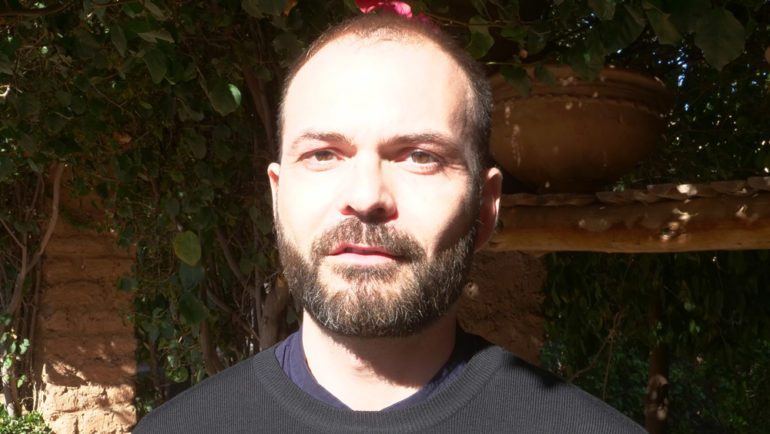‘Kilometers 60,’ ‘Gunpowder,’ ‘Fish’ Win at Marrakech’s Atlas Workshops
By Martin Dale
LOS ANGELES (Variety.com) – Hassen Ferhani’s “Kilometers 60” won the €20,000 ($22,700) post-production prize Wednesday at Marrakech Film Festival’s Atlas Workshops, a four-day fast-track program for 14 projects from Africa.
The Atlas Workshops, one of the key innovations of this year’s festival, were sponsored by Netflix and coordinated by Remi Bonhomme (pictured), program manager of the Cannes’ Critics’ Week.
“Kilometers 60,” a documentary about an elderly lady who runs a tiny café on a highway in Algeria, is described by Ferhani as a “road movie that stays in one place.” His previous feature, “Roundabout in My Head,” was a hit on the festival circuit. The helmer said that he was delighted to receive the prize and the overall experience of attending the workshop in particular in terms of the editing advice provided.
Six projects competed for the prize, with a jury formed by Match Factory’s Zsuzsi Bánkuti, Moroccan producer Saïd Hamich and Cannes Critics Week’s artistic director Charles Tesson.
The €10,000 ($11,300) development prize was awarded to Inadelso Cossa’s documentary “The Nights Still Smell of Gunpowder,” which uses found footage to explore his own memories of the Mozambican civil war, in which his grandmother sheltered him as a child from the horrors of the war through fictions such as telling him that the nightly gunfire was fireworks. Cossa said that he was delighted by the award and the film-friendly atmosphere at Marrakech.
The jury was formed by producer Joslyn Barnes, director Philippe Lacôte and Netflix exec Funa Maduka.
Aida Elkashef’s “The Day I Ate the Fish,” about Egyptian women imprisoned in Cairo because they murdered their husbands, won the $3,000 NAAS prize for film circulation, and she will be invited to present the film in the Network of Arab Alternative Screens.
The jury was formed by exhibitors Amel Saadallah, Mosa Rahmat Alla and Ibrahim Saad.
The event significantly reinforces Marrakech’s industry dimension, with more than 200 participants, including producers and directors from the Arab world and Africa, leading sales agents and 40 festival programmers.
Funa Maduka, Netflix’s development and acquisitions executive, who attended the event, stated that it was extremely beneficial to see projects at this stage and meet the respective directors and producers.
The festival programmers attending the workshops included Bero Beyer (Rotterdam), Karel Och (Karlovy Vary), Mohamed Hefzy (Cairo), Christian Jeune, Charles Tesson and Valentina Novati (Cannes), Alessandra Speciale and Teresa Cavina (Venice), Orwa Nyrabia (IDFA), Antoine Thirion (Locarno), Nejib Ayed (Carthage) and Jay Jeon (Pusan).
“The leading big and small festivals are all here,” says Christoph Terhechte, Marrakech’s artistic director. “Programmers are the festival goers who travel the most, and who can spread the word the easiest. Their appreciation is vitally important for a festival and an industry workshop to sustain itself.”
The Atlas Workshops aim to create a platform that will leverage links between Moroccan filmmakers and the international market, and create a new industry hub for Arab and African filmmakers.
Bonhomme worked for 10 years in Lebanon as attaché for cultural events to the French embassy and his work at Cannes’ Critics’ Week has also furthered his sensibility toward the region.
“In Arab and African countries there are many cinephiles, but few national funds and a shortage of screens, especially arthouse cinemas;” Bonhomme said. “We want to foster greater regional collaboration through the workshops, in terms of both coproductions and artistic collaboration across the region, which younger filmmakers are particularly open to.”
Bonhomme said he is delighted having Netflix on board: “Netflix is potentially a very strong player for Africa given the lack of cinemas and cross-border links in the region. It’s a new avenue for filmmakers and producers. The African continent is a big challenge and has significant market potential and it’s great to have them with us for the first edition.”
Presentations made during the workshops included Cameron Bailey, artistic director and co-head of the Toronto Intl. Film Festival, who talked about how to foster stronger links between international film festivals and African cinema.
Bailey talked about his experience at Toronto with the Planet Africa sidebar, which ran between 1995 and 2004, and events such as City to City Lagos in 2016, which he curated with advice from Netflix’s Funa Maduka.
He said that in the 1990s there was major visibility of films related to Africa, Afro-American issues and the African diaspora, which then diminished somewhat in the early 2000s, but is now gaining renewed prominence.
“Audiences are trained to look for European art cinema and Hollywood cinema, and tend to read films through those two lenses. African films have different cinematic codes.”
He cited films such as Genevieve Nnaji’s “Lionheart,” Netflix’s first original film from Nigeria. “Films like Lionheart is what we’re looking for at a festival like Toronto: a very local cinematic culture that can speak to the whole world.”
Like many participants at the workshops, Bailey considers that there is tremendous potential for closer ties between the Maghreb countries in North Africa and the sub-Saharan African countries. “I respect the major distinctions across the continent, but I’d love to see more connections and greater dialogue. I think with greater dialogue African cinema can achieve a reinforced presence on the world stage.”

